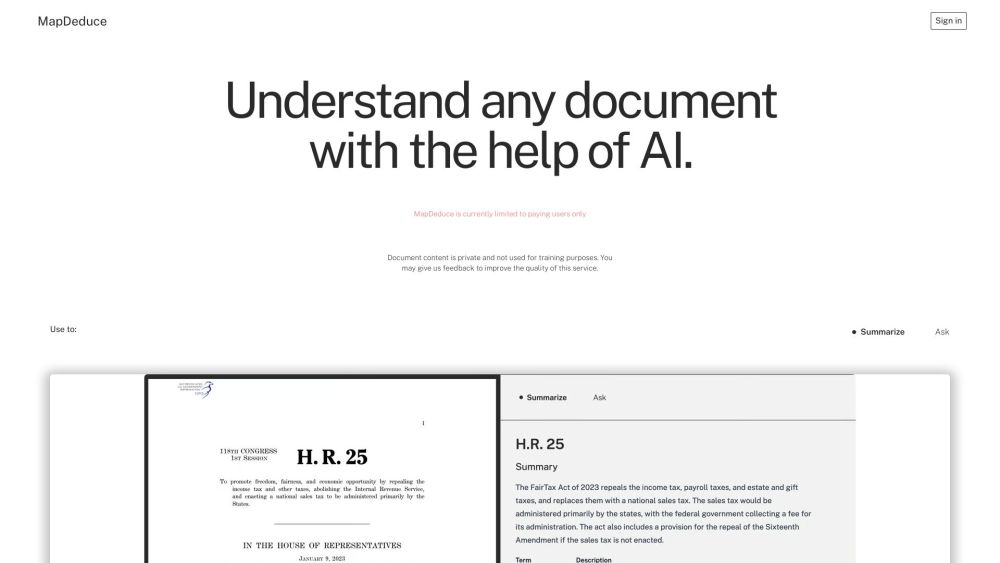FAQ , but rewritten in original language and tone. The HTML formatting and image reference have been preserved as requested. ---

What is MapDeduce?
MapDeduce is an advanced AI-powered platform designed to simplify how users interact with complex documents. Whether you're reviewing legal contracts, market research, or technical reports, MapDeduce helps break down the content by offering concise summaries in any language. It also enables users to ask questions and receive accurate answers, all backed by relevant source material directly from the document.
How to Use MapDeduce?
Using MapDeduce is simple and intuitive. Start by uploading your documents in formats such as PDF, DOCX, PPTX, or TXT. Once processed, the tool generates a detailed summary, giving you a quick overview of the most important information. You can then dive deeper by asking specific questions, and MapDeduce will extract the relevant details from the text. It's ideal for identifying risks in contracts, extracting insights from reports, or analyzing data across multiple files efficiently.
Key Features From MapDeduce
MapDeduce comes with a robust set of tools to help users extract value from their documents:
- Multilingual Summarization: Get document summaries in any language, making global communication and understanding easier.
- Interactive Document Navigation: Ask natural language questions and receive precise answers along with source citations.
- Multi-Document Query Support: Compare and analyze information across several documents in one go.
- Red-Flag Detection: Automatically identify potentially risky or problematic clauses in legal or contractual documents.
- Global Language Support: Work seamlessly with documents in multiple languages, tailored for international users.
- Chrome Extension: Enhance your browsing experience with the MapDeduce Chrome extension, allowing instant document analysis from any PDF online.
MapDeduce Use Cases
MapDeduce is especially beneficial for professionals who regularly handle large volumes of documents, such as lawyers, financial analysts, and business strategists. It can assist in reviewing contracts, interpreting research data, and evaluating technical inspection reports with speed and accuracy.
MapDeduce Support Email & Customer Service Contact & Refund Information
For any inquiries or support, please visit the official contact page.
MapDeduce Pricing
Explore our subscription plans and pricing details at the MapDeduce pricing page.
FAQ from MapDeduce
What is MapDeduce?
MapDeduce is an AI-based document analysis tool that simplifies complex texts by summarizing them and enabling users to ask questions for deeper insights.
How to use MapDeduce?
Upload your document in a supported format like PDF, DOCX, PPTX, or TXT. The tool will process it and provide a summary. You can then ask questions to extract specific information from the file.
What types of documents can MapDeduce handle?
MapDeduce supports a wide range of file types including PDF, DOCX, PPTX, and TXT, making it versatile for various use cases.
In which languages can MapDeduce summarize documents?
MapDeduce supports summarization in any language, catering to users around the world.
Can MapDeduce analyze multiple documents at once?
Yes, users can upload and analyze multiple documents simultaneously, enabling cross-referencing and comparative analysis.
Is MapDeduce suitable for legal professionals?
Absolutely. Legal professionals can use MapDeduce to identify critical clauses, detect red-flag terms, and quickly navigate through lengthy contracts.
Does MapDeduce have a Chrome extension?
Yes, MapDeduce offers a convenient Chrome extension that allows users to analyze PDFs directly from their browser for increased efficiency.
--- Let me know if you'd like a version tailored for a specific audience (e.g., enterprise users, students, etc.) or optimized for a specific keyword.